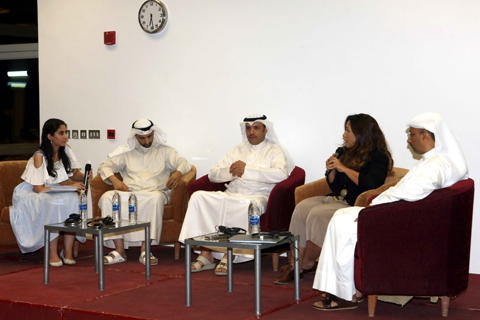 KUWAIT: A picture showing the keynote speakers at a symposium called 'Domestic Workers in Kuwait between Local Laws and Social Attitudes,' held at the American University of Kuwait on Sunday. - Photo by Joseph Shagra
KUWAIT: A picture showing the keynote speakers at a symposium called 'Domestic Workers in Kuwait between Local Laws and Social Attitudes,' held at the American University of Kuwait on Sunday. - Photo by Joseph ShagraKUWAIT: The Center of Gulf Studies at the American University of Kuwait (AUK), in collaboration with the One Roof campaign, held a symposium called 'Domestic Workers in Kuwait between Local Laws and Social Attitudes' at AUK on Sunday.
Mohammad Al-Ajmi from the Domestic Workers' Department provided a legal view about the new domestic law.
"This law was issued on July 23, 2015, and was applied from July 31, 2016. This law improves the rights of domestic laborers, as it allows them to file cases at the labor court, so they do not pay fees as they used to do at the regular courts. This law also gave our department the power to cancel the contract with the sponsor due to improper accommodation," he noted.
He provided some statistics. "Our department received 1,431 complaints that we resolved, while 41 were sent to the court. Also, in the past three months, we solved 13,000 cases of unpaid salaries. We canceled some contracts and allowed the domestic workers to go back home. There are 669,000 domestic workers in Kuwait, while the cases filed in the court by domestic workers are around 1,300, which is around five percent, which is not very high," added Ajmi.
The new law brought more benefits for workers. "This law specified the working hours of workers - not to exceed 12 hours with rest periods in between, and not work more than five hours continuously," he said. The Domestic Workers' Department (DWD) is part of the Residency Affairs Department of the Ministry of Interior that was founded in 1992. "We inspect domestic worker agencies even during holidays, and we shut down 68 of these agencies for breaking the new law," said Ajmi.
Oppression
Bibi Al-Sabah from the Social Work Society said when she started working at the society in 2005, the new law was not issued yet and domestic workers were oppressed. "We had to beg the sponsor to pay pending salaries to the maid. But the new law improved this situation through the DWD that forces the sponsor to give the domestic workers their rights, and this simplified our work," she explained.
Falah Al-Mutairi from the foreign workers' shelter said the shelter was founded in 2014 and is the biggest of its kind capacity-wise in the Middle East, but many people in Kuwait doesn't know about it. "Currently the shelter is for women only, but we are planning to expand it for men as well. We help domestic workers in need and even victims of human trafficking. We offer psychological services, accommodation, food and personal requirements, in addition to a fully-equipped clinic. It can accommodate 500 workers," he pointed out.
Taher Al-Baghli from the Human Line Organization highlighted some shortages in the new law. "The new domestic law 68/2015 brought many advantages such as forbidding cutting a worker's salary or setting penalties for forcing the workers to work overtime. But there is no mention of blackmailing, for instance. The law also didn't specify the penalties for the sponsor if the worker doesn't get healthcare or indemnity. The penalties for some violations are a six-month ban on getting a domestic worker, but the worker won't benefit from this penalty," he pointed out.
By Nawara Fattahova, Staff Writer










